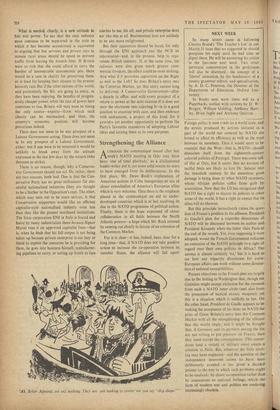Strengthening the Alliance
A LTHOUGH the communiqué issued after last ..week's NATO meeting in Oslo may have been 'one of total platitude,' as a disillusioned leader-writer put it, yet some solid results do seem to have emerged from its deliberations. In the first place, Mr. Dean Rusk's explanation of American actions in Cuba inaugurates an era of closer consultation of America's European allies which is very welcome. Then there is the emphasis placed in the communiqué on aid to under- developed countries which is at last receiving its due in the NATO programme of political action. Finally, there is the hope expressed of closer collaboration in all fields between the North Atlantic powers—a hope which Mr. Rusk stressed by coming out clearly in favour of an extension of the Common Market.
For it is clear—it has, indeed, been clear for a long time—that, if NATO does not take positive action to increase the co-operation between its member States, the alliance will fall apart.
'Ah, Senor Admiral, eet eez nothing. They are just making ze streets 'ow you say "ship shape."'
Foreign policy is now r-ade on a world scale, and the strains produced, by actions initiated in a part of the world not covered by NATO are bound to affect its efficiency as well as the trust between its members. Thus it would seem to be essential that the West—that is, NATO—should dissociate itself from the eighteenth-century, colonial policies of Portugal. There was some talk of this at Oslo, but it seems that no amount of tactful hints are likely to lure Dr. Salazar into the twentieth century. In the meantime great damage is being done to other NATO members, whose African policies suffer from guilt by association. Now that the US has recognised that NATO has a right to discuss its policies in other areas of the world, it has a right to expect that its allies will do likewise.
But this principle immediately raises the ques- tion of France's position in the alliance. President de Gaulle's plan for a tripartite directorate of NATO will be discussed between its author and President Kennedy when the latter visits Paris at the end of the month. Yet, even supposing it were adopted, would the French Government welcome an extension of the NATO principle to a right of regard over their own policies in Africa? The answer is almost certainly `no,' but it is hard to see how any tripartite directorate for extra- European affairs can work without some diminu- tion of national susceptibilities.
Present objections to the French plan are largely due to the feeling in Washington that, though the Germans might accept exclusion for the moment from such a NATO inner circle (and also from the possession of tactical atomic weapons), yet this is a situation which is unlikely to last. On the other hand, President de Gaulle appears to be making the acceptance of his ideas on NATO the price of Great Britain's entry into the Common Market with all the strengthening of the alliance that this would imply; and it might be thought that, if Germany and its partners among the Six are not willing to put pressure on France, then they must accept the consequences. This conun- drum (and a variety of military ones) awaits a solution in Paris. But, whatever the Oslo meet- ing may have neglected—and the question of the independent deterrent seems to have been deliberately avoided—it has given a decided pointer to the way in which such problems ought to be resolved: by closer co-operation rather than by concessions to national feelings, which the facts of modern war and politics are rendering increasingly obsolete.






































 Previous page
Previous page